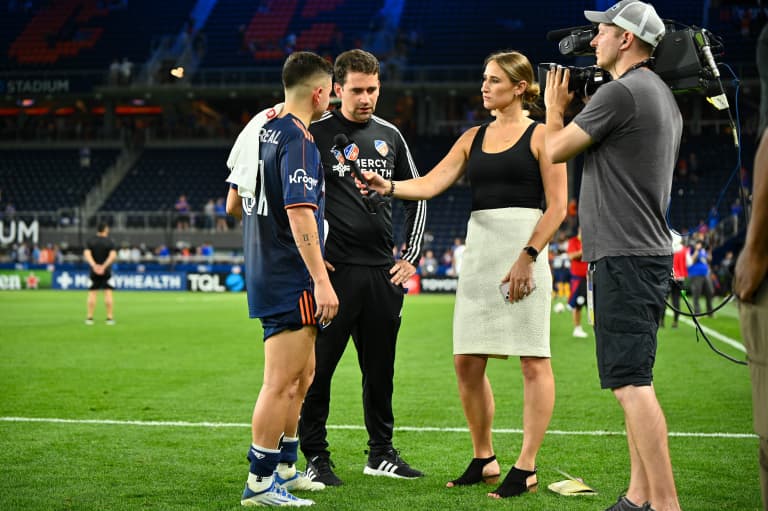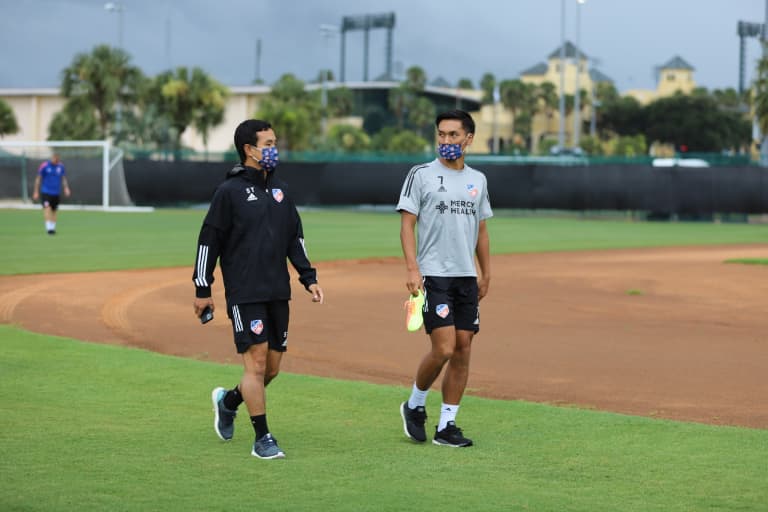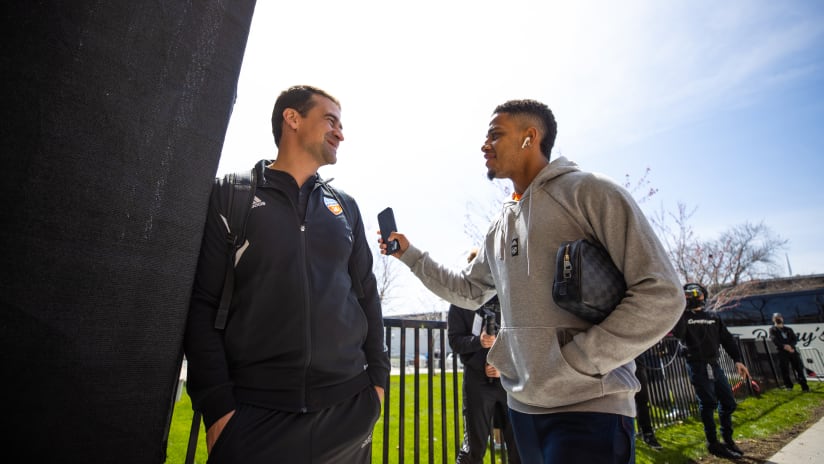FC Cincinnati’s player welfare department is an ever-growing and developing part of the FCC world. Under the leadership of Dan McNally, Director of Soccer Operations & the Mercy Health Training Center, the soccer operations and player welfare team added Rodrigo Frank in January as the club’s Player Welfare Coordinator, or as he would describe it, player care.
“It's not a concierge service,” Frank said. “It's a player care service. We are caring for them. We care for their families. Kids’ schools, we’re caring for it. Wives need anything, we’re caring for it. These players, anything that they need off the field, we’re caring for it. “
Frank, a native of Salvador, Brazil, speaks three languages, Portuguese, Spanish, and English, and he, alongside FCC Senior Manager of Soccer Operations Satoshi Tatsumi, assist the first team players with various needs as they come into Cincinnati, often from distant states or other countries, for the first time. They also provide care and support to players while at FCC.
“The first thing I told the team when I took the job last year was that a club is only as successful as the players that take the field on the weekend,” said Chris Albright, the club’s General Manager. “Everyone’s livelihoods are dependent on them. Player care is a crucial aspect of what we’re trying to build at FC Cincinnati. The work that Satoshi, Rodrigo, and all our staff do to support our players off the field is invaluable in allowing them to focus on their responsibilities on it.”

As Albright, Head Coach Pat Noonan, and the club’s coaching staff continue their work to get things right on the field, it’s the soccer operations, and more specifically the player welfare department, who are continuing the work to get things right off the field for the club.
“Since we started FC Cincinnati back in 2015, taking care of our players has always been a top priority,” said McNally. “We are now in a fortunate position to add quality staff such as Satoshi and Rodrigo to really lead our expanding player welfare department. I’d also mention the work that Blair Stevenson has done with FC Cincinnati 2, getting that team off the ground, and caring for them as well.”
Back in Brazil, Frank’s uncle was the president of a professional club. Frank was always around clubs and players, and he noticed the issues and concerns from players would arise while playing professionally. He transitioned to working for a player agency, and those things became even more apparent. It inspired him to dedicate himself to caring for professional players.
“It’s not enough to simply sign a good player,” he said. “You need to give players the tools to be good. If you buy a Ferrari, you don’t just go to any store and buy any tire or buy any oil. It won’t work. That Ferrari won’t run the way it should. You need to provide the things that the Ferrari needs. It’s the same thing with every player at FCC. We need to provide them with the care they need to operate at the highest level.”
Tatsumi, a native of Nara, Japan, joined FC Cincinnati’s soccer operations team in January 2019 as the club transitioned to MLS. When Yuya Kubo arrived from KAA Gent, Tatsumi was able to speak his native Japanese as he got accustomed to Cincinnati.
“He helped me a lot,” said Kubo. “He helped me find an apartment for my wife and family. Because I didn’t speak much English at all, he helped us set up the little things—find schools, find babysitters, everything.”

When Goalkeeper Alec Kann arrived this offseason, he immediately connected with Frank at the hotel.
“Since day one, Satoshi and Rodrigo have really made me feel at home here,” said Kann. “We moved to a city where I don't know anyone and don't really know the lay of the land. They were super helpful with finding apartments, getting my fiancé settled here, making sure that she got sorted with everything.”
For this season, Frank put together a Player Handbook, including everything players may need to know about living and working in Cincinnati. It includes the contacts of club staff who can help with things such as medical issues, media and marketing requests, tickets and more.
Additionally, it has information on local restaurants, recommended by the club’s culinary staff. It has all types of restaurants, whether they offer vegan or vegetarian options, where they’re located, and more. It has information on local schools, where players who are moving to Cincinnati can reference to find the best schools for their children while they are playing here.
“If you're from another country, and you want certain food, for example, we're going to look for places that sell that food, so you can buy it,” said Frank. “We are giving all these tools to the players so that all they do is focus on the field. They can leave the off-field problems to us, so we can solve them.”
As the player welfare department continues to grow, so will the efforts to make FC Cincinnati the best place to play professionally.
“That is the main reason why I do this job: to make these players feel not just like a machine—because they're human beings,” Frank said. “That is a link that is off a little bit in football as a whole. I got into this world to see if I can put that link back together and fix some of these things off the field, and I think we’re doing a good job of that in Cincinnati.”

